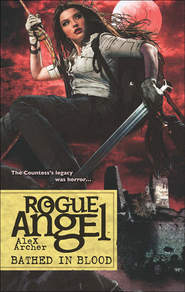По всем вопросам обращайтесь на: info@litportal.ru
(©) 2003-2025.
✖
The Oracle's Message
Автор
Год написания книги
2019
Настройки чтения
Размер шрифта
Высота строк
Поля
Spier called for another round of drinks and then winked at Annja. “I’m almost positive that we will. Now that you have joined our expedition.”
6
Spier and the rest of the men excused themselves after they’d had another round of drinks. Annja nursed her glass of wine as Hans stayed behind, as well. Part of her was happy about that, but part of her suspected something else might be going on. Just before Spier had left the table, he’d exchanged a knowing look with Hans.
Annja was comfortable with the decision she’d made to join the expedition, but she wanted to make sure that Hans didn’t have any misconceptions about the nature of their relationship.
They waited in comfortable silence until the pavilion had pretty much cleared out. One of the resort’s boats was taking a big group over to a neighboring island where they had a nightclub. Annja had no interest in going.
“Joachim is very pleased that you’ve decided to accompany us on this expedition,” Hans said.
Annja looked him over. He was smiling at her and seemed brimming with confidence. “How did you get that scar?” she asked.
He touched his face self-consciously. Annja grinned. “I didn’t mean to imply that it’s horrible or anything. I was just curious.”
Hans smiled. “Doesn’t the discussion of scars and how we got them usually take place after we’ve slept together? Isn’t that what people like us do in the afterglow of orgasm?”
“People like us?” Annja sputtered, surprised by the man’s blunt statement. “And what is that supposed to mean?”
“You can’t deny it, Annja. I knew it from the moment I looked at you. You’re a warrior.”
Annja raised an eyebrow. “So does that mean you’re one, too?”
“I was,” he said. “Once.”
Hans got a faraway look in his eyes and Annja frowned. She knew what it was like to have dark memories. Sometimes the demons that you’d killed stayed away for a while. But sometimes they came back.
“Military?” she guessed.
Hans nodded. “I was a paratrooper. In Afghanistan. Working with the coalition forces at the time. Such as they were.”
“I didn’t think Germany had much of an official presence over there.”
Hans sighed. “We had a few units. Some of whom disgraced themselves. Public opinion caused the chancellor to resign. Germany pulled out most of its units. But you know that doesn’t stop the shadow governments that work despite the best interests of the people they’re elected to supposedly protect.” He finished off the remainder of his drink and slapped the glass back down on the table. “An arrangement was reached with the United States. Germany would supply a small unit of commandos—specialists trained in mountain warfare—for long-range reconnaissance patrols. Our task, as it was set forth, was to locate high-value Taliban targets.”
“So you were special operations.”
Hans nodded. “Don’t hold it against me, all right?”
Annja smiled. “I won’t.”
Hans looked out at the frothy black sea. “We were dispatched to a high mountain pass in the Helmand province. Do you know it?”
“In the southwestern part of the country, isn’t it? But I thought it was mostly desert.”
“Helmand is the main source of opium in the country. It produces more than the entire country of Burma. Intelligence suggested that the Taliban was funneling fighters mixed in with opium shipments. But rather than venture south through the desert toward the Balochistan area of Pakistan, they instead chose to journey north toward the Helmand River.”
“You were ordered to intercept them?”
Hans nodded. “We set up our observation post atop one of the higher mountains in Nawzad. We were able to use small unmanned vehicles to keep track of all the entry points in the region.” He shook his head. “It was exhausting work, sitting in that mountain range. The sun scorched us mercilessly. We had to maintain strict secrecy the entire time. The locals were all friendly to the Taliban and would have given any of us away if they had known we were there.”
“How did you manage to stay concealed for so long?”
Hans grinned. “Well, that’s what we were trained to do. My unit was sent out to live on the mountains all over the world. We went in with just enough supplies—mostly ammunition, medical and communications gear. We took some rations, but otherwise we were to live off the environment. It was a very special group of men I had volunteered to serve with. Any one of us would gladly have died for the others.”
“What happened?”
Hans paused a moment before continuing. “On the third night we were there, we got a message that one of the drones had visual contact with a drug convoy approaching our area.
“It was night, so we had a tough time trying to pick them out among the rocks down near the river, but we also had night-vision equipment. Once we switched on, we could see them clearly. One or two pickup trucks, a whole host of mules laden with large boxes of opium packed tightly for transport. And they had close to one hundred fighters with them.”
Annja leaned forward. “How many of you?”
“Four.”
“Those aren’t good odds any way you cut it.”
Hans shrugged. “We called in close air support. We had laser painters—do you know what those are?”
“It shoots an invisible laser at a target that fighters and bombers can use to guide their ordnance, right?”
Hans looked at her a second before grinning. “You seem remarkably well-versed in military terminology, Annja.”
“You’re not the first soldier I’ve met, Hans.”
“I’ll bet.”
“So, anyway…”
Hans grinned. “We directed a squadron of planes down on them and they turned the entire river basin into scorched earth. When the dust and debris cleared, the only things left behind were the smoldering hunks of what had been the pickup trucks. Everything else had been utterly destroyed.”
Annja nodded. “So, mission successful. Good stuff.”
“Ordinarily, on a mission like that, we would have been immediately extracted and moved to a different area. That’s just to protect the unit, you understand.”
“Sure. Why leave you there when the locals would have known that there must have been a unit operating in the area.”
“Exactly.” Hans sighed. “It amazes me that it seems so logical to you, and yet to my own government it was not what they did.”
“They didn’t pull you out?”
“No. They left us there. The first strike had proven so successful, they wanted us to stay in place to make sure the Taliban didn’t try to come through the region again.”
“But—”
Hans held up his hand. “I know, I know. It defies all proper sense of logic and intelligence. But bureaucrats are not warriors for good reason. They’d be dead within minutes if they ever stepped onto a battlefield.”
“That must not have gone over well with the other members of your team.”











